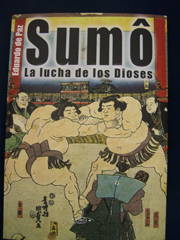| Yokozuna Comparisons Joe Kuroda |

 |
| Amateur Sumo's Global Aspirations Courtesy: International Sumo Federation |

 |
| Rikishi of Old Joe Kuroda |

 |
| Heya Peek Barbara Ann Klein |

 |
| SFM Interview Mark Buckton |

 |
| Sumo 101 Barbara Ann Klein |

 |
| Photo Bonanza See the Haru |
 |
| Haru Basho Review Lon Howard |

 |
| Lower Division Rikishi Mikko Mattila |

 |
| Natsu Basho Forecast Mark Buckton |

 |
| Kimarite Focus Mikko Mattila |

 |
| Sumo in Print Mark Buckton |

 |
| Kokugi Connections Todd Lambert |

 |
| Fan Debate Facilitator – Lon Howard |

 |
| SFM Cartoons Benny Loh & Stephen Thompson |

 |
| Let’s Hear From You What was it that |

 |
| Readers’ Letters See what some |

 |
Sumo Quiz
The Quizmaster
Answer the Qs and win yourself next basho’s banzuke.
A couple of small points appear to already have changed – the heya address of Tamanoi-beya
just one example – but considering the ever flowing currents of sumo, no similar book will remain untouched by change for ever.
Another point of huge merit in setting this book apart from many of its peers is the involvement of several of sumo's more prominent non-Japanese fans, be they in the Land of the Rising Sun or not. The credits and acknowledgements make interesting reading themselves with many of these ‘names’ (to shamelessly borrow a stock phrase from Lloyds of London) appearing to have contributed to the book.
Add this factor to the pages detailing the sport as it has been adopted and modeled by the Internet community and a list of the sites owned by some of the aforementioned ‘names’ and you have, if I am not very much mistaken, the world's first book-published list of sumo-
themed Internet sites. (Although, SFM's non-
appearance in this chapter will have to be rectified in the second edition!)
Next
Many of these books are available on the Internet or from well-stocked Japanese bookshops with an English language section. Yet, while several other publications in European tongues have made it into print, sumo coverage in such a major linguistic force as Spanish has been noticeably underachieving in modern times.
All that changed earlier this year with the appearance in my and several other post boxes
around the world of: Sumo – La lucha de los Dioses.
Produced over a couple of years by Spain's most famous fan of
Containing chapters on the history of the sport with lists of Heisei era yusho winners, yokozuna of lore, kimarite and even heya life (with an admirably collated listing of each heya address), to name but a few, much of the subject matter covered in at least eleven other English-language publications is covered again – but is done so in a well-updated

